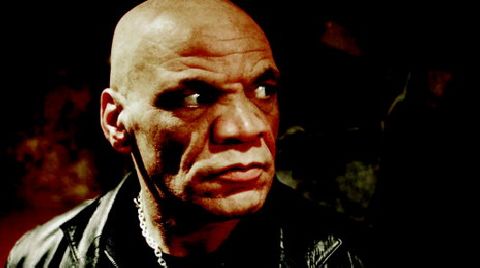Dead Man’s Cards (2006) 
“Even the bravest men fall”

Director: James Marquand
Cast: Paul Barber, Tom Bell, Samantha Womack
Synopsis: In an after-hours world of pug-faced scouse smack addicts and street fights, James McMartin and his mentor Paul Barber are privy to a doorman’s-eye-view of a life most of us only glimpse…
Paul Barber is a revelation in Dead Man’s Cards. Most Brits know him as the hapless Denzil on Only Fools and Horses, while overseas viewers might remember him from The Full Monty. He’s an inspired piece of casting nevertheless. In fact, in terms of looks nearly all the characters are perfectly cast, possessing the rugged, weather-beaten looks and world-weary cynicism of those who find themselves trapped in a low-income underclass existence on the fringes of a criminal life that’s fuelled not by the desire for wealth but by the need for the next fix. Everyone involved look like they’ve been around the block a few times — apart from the bad guy who possesses sleek model looks as does the gorgeous Samantha Janus who plays tough guy Tom’s less-than-understanding wife.
The film, set in the backstreets of Liverpool, borrows heavily from old Hollywood westerns such as Rio Bravo and it’s a transplantation of genres that works remarkably well. Ten years ago it might have looked a bit far-fetched, but today, with the explosion in gun culture in the UK, bar-room shootouts are becoming all too believable. The seedy spit-and-sawdust bar run by Billy the Cowboy (played by Tom Bell — Straight on Till Morning, Royal Flash — in full-on Walter Brennan mode) is the modern-day version of one of those western saloons, all bare floorboards stained by the blood from long-ago fights — all that’s missing is a spittoon at the end of the bar. Paul and Tom stand at the door each night, barring entry to those in trackies or whom they suspect of carrying weapons, and they look like every bouncer you’ve ever come across (or perhaps that you used to come across a few years back before they became ‘doormen’, a development that is handled with typically dry humour by Dead Man’s Cards).
While some of the acting is a little shaky (Mark Russell — I Against I — as bad guy Chongi is especially poor, although this was his first film and he was apparently called in at short notice) the intelligent storyline and attention to detail carry it through, and you get the impression that this film really matters to the people making it. The violence is brutal and is nothing like the stylised violence of glossy Hollywood thrillers, but those unfortunate enough to have witnessed a real pub fight will know its brutality is overshadowed only by its realism. In real life fighters don’t take turns throwing punches; they wade in at full pelt, blindly hoping to make contact and, once they have, they kick and punch any part of their opponent as hard and fast as they can in order to prevent him from hitting back. Their faces grow red, they quickly start to breath heavily and their eyes are stripped of any intelligence they might have held. A pub fighter will also bite any fleshy protrusion their teeth will clamp around and will hold on until their teeth meet. The random violence shown here is all too true-to-life, a fact which, given the subject matter of the film, is well-handled.
If the film falls down in the last reel it’s perhaps only because it leaves viewers with too much to figure out for themselves. Chongi’s final act is all too logical when you think about what he has heard about receiving a bullet in an envelope.
Given the generally low standard of gangster films that followed in the wake of the success of Lock, Stock, writers James Marquand and James McMartin are to be credited with crafting an absorbing, realistic and intelligent crime thriller.
httpv://www.youtube.com/watch?v=xSCFleKt4I0
